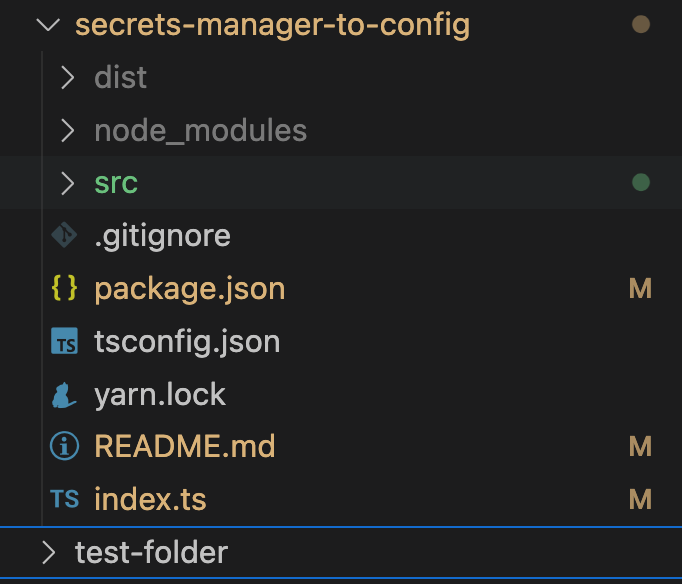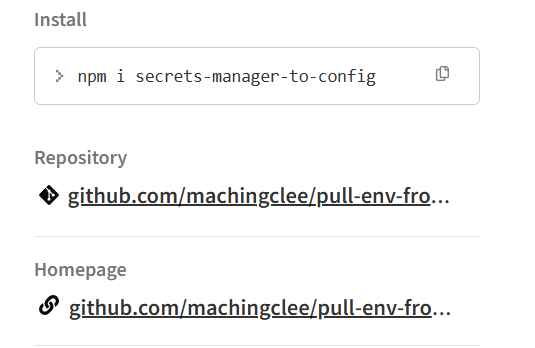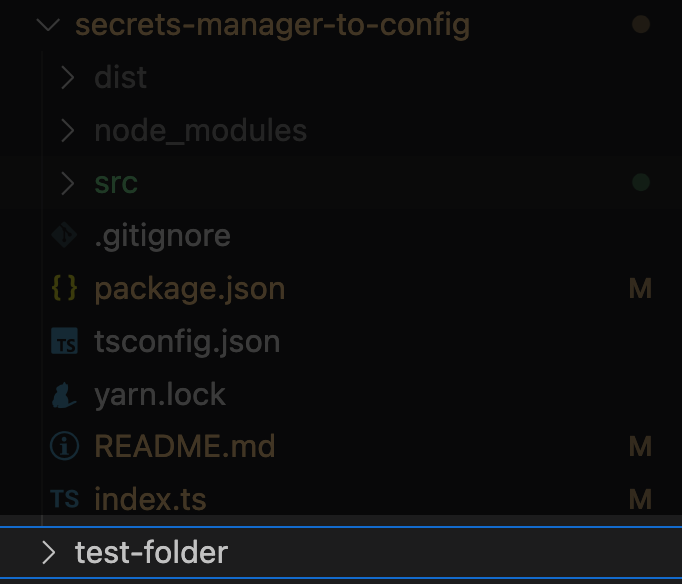Resulting Package
Project Structure
We will explain the following important files:
tsconfig.jsonpackage.jsonindex.ts
And to test our package we created another folder called test-folder.
Let's Develop our Package: secrets-manager-to-config
secrets-manager-to-configFolder secrets-manager-to-config/
index.ts
1import { downloadConfig } from "./src/env-pull" 2import { FileFormat } from "./src/SecretUtil" 3 4export { 5 downloadConfig, FileFormat 6}
Up to this part we have achieved "named export". Package consumers can import our functions via
import { downloadConfig, FileFormat } from "secrets-manager-to-config";
The default export cannot be destructured as above directly:
7export default { 8 downloadConfig, FileFormat 9};
package.json, setting homepage and repository info as well
The highlighted lines are important to identify the entrypoint of our transpiled ts project. The remaining come from npm init.
1{ 2 "name": "secrets-manager-to-config", 3 "version": "1.0.11", 4 "description": "Pull secrets from secrets managers as nested json or yml file", 5 "scripts": { 6 "build": "tsc", 7 "test": "echo \"Error: no test specified\" && exit 1" 8 }, 9 "types": "dist/index.d.ts", 10 "main": "dist/index.js",
Next to display the following
we add
11 "repository": { 12 "type": "git", 13 "url": "https://github.com/machingclee/pull-env-from-secrets-manager.git" 14 }, 15 "homepage": "https://github.com/machingclee/pull-env-from-secrets-manager#readme",
Here the repository url comes from the https-clone option in github.
Finally we fill in the rest:
16 "keywords": [ 17 "secrets-manager" 18 ], 19 "author": "machingclee", 20 "license": "MIT", 21 "devDependencies": { 22 "@types/js-yaml": "^4.0.9", 23 "ts-node": "^10.9.2", 24 "typescript": "^5.8.3" 25 }, 26 "dependencies": { 27 "@aws-sdk/client-secrets-manager": "^3.799.0", 28 "@types/lodash": "^4.17.16", 29 "@types/minimist": "^1.2.5", 30 "js-yaml": "^4.1.0", 31 "lodash": "^4.17.21", 32 "minimist": "^1.2.8" 33 } 34}
tsconfig.json
{ "compilerOptions": { "target": "ES2020", "module": "CommonJS", "moduleResolution": "node", "esModuleInterop": true, "declaration": true, "outDir": "./dist", "strict": true, "skipLibCheck": true, "forceConsistentCasingInFileNames": true }, "include": ["**/*.ts"], "exclude": ["node_modules", "dist"] }
Build the package
We execute
yarn build
to execute our tsc script, which uses our tsconfig.json to identify the output directory.
Test our package before publishing it
Import the package locally
Let's cd into this folder:
Let's npm init and add our package into package.json:
{ "dependencies": { "secrets-manager-to-config": "file:../secrets-manager-to-config", "tsm": "^2.3.0" } }
We also added tsm for a light-weighted binary executing our ts file.
Now when we run yarn, it will install our package and its dependencies into the current project.
At this point we can write a test file to test the import:
// test-folder/env-pull.ts import { downloadConfig, FileFormat } from "secrets-manager-to-config"; downloadConfig();
Modify the package and import it again for testing
After adjusting the original package, we
yarn buildinsecrets-manager-to-config/- Delete
test-folder/node_modules cdintotest-folder/and runyarnto install everything again
Publish it
We need to
npm login, and thennpm publish


